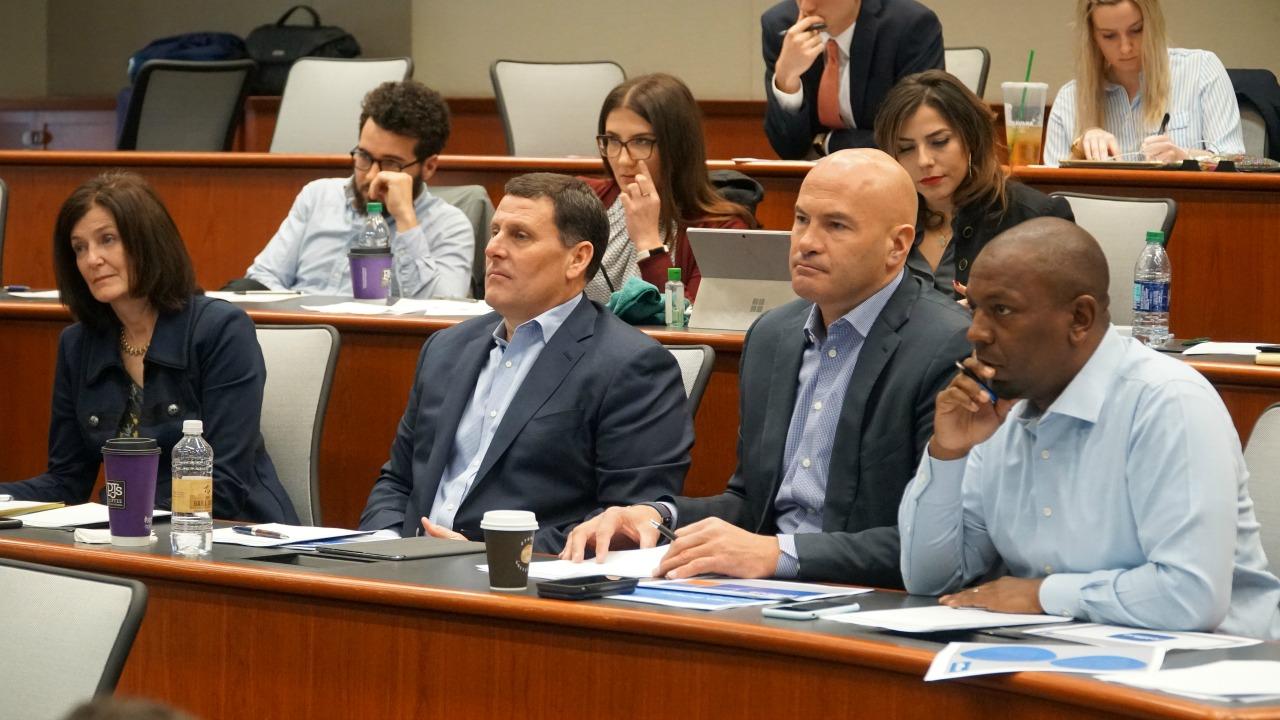Business “Boot Camp” for law students draws top industry executives
Does valuation matter when negotiating a merger deal? Does a company’s debt make it more or less attractive in a takeover situation? How can two companies merge completely different cultures to make one, improved entity?
High-level corporate expertise can be the arrow missing in a young lawyer’s quiver. So, Tulane Law School and the A.B. Freeman School of Business teamed up three years ago to hold a Business Literacy Boot camp for first-year law students. Running concurrently with the January legal skills Intersession Boot Camp for upperclassmen, which took place last week, the program packs an introduction to what is often a daunting business world.
“Business concerns are often central to an attorney’s practice – whether a client is developing a business, working with a business, or litigating with a business,” said Prof. Elizabeth Livingston de Calderon, a Clinical Instructor at the law school and a co-director and faculty with the program. “But so many students coming into law school have a liberal arts background with no information about the basics in business and how business people approach things.”
See the boot camp's photo gallery here.
Along with Prof. Mara Baumgarten Force and a handful of law and business school faculty, the business literacy boot camps cover the basics of business, capped off by a Friday presentation by students to a “mock” board of directors considering the merger of two airlines. Throughout the week, visiting faculty step in to lecture and mentor students as they prepare for that final test, considering everything from company values to new market opportunities to the blending of corporate cultures.
This year, the program registered about a quarter of the first-year class, and has consistently upped the ante on landing top-notch speakers and industry leaders who lecture students, coach and critique, and serve as “board members” during the Friday morning presentations proposing a mock merger between two airlines.
For example, the 2017 course saw retired JetBlue Chief Financial Officer Mark Powers, who teaches financial management at the business school, lecture on the industry and serve as a “board member” for the final presentations. This year’s board consisted of:
- Brandon Nelson, General Counsel and Corporate Secretary with JetBlue;
- Jim Hnat, former General Counsel, Executive Vice President and Corporate Secretary of JetBlue.
- Bill Carter, CEO of ALM, the publisher of The Asian Lawyer, The American Lawyer, law.com and several other legal and real estate news titles;
- Julia Lennox, a business strategy consultant and former Chief Marketing Officer with MetLife’s B2B divisions, and former executive at Pfizer, among others;
- Michael Morse, President and CEO of US-based snack brand Louisiana Fish Fry;
Laurel Sheridan was a first-year law student in 2018 when she signed up.
“You get so much out of it that you need as you prepare to work with clients,” said Sheridan (L’20). “Things like alternate dispute resolution and really understanding what each side wants, which is so important in working with any client.”
This year’s students said the crash-course on business practices gave them confidence.
“To be honest, before this week I didn’t know anything about business at all – and now, I feel like I can have a conversation with someone about it,” said Katie Ricks (L’21). The truth is, as a lawyer, you’re going to have to figure things out on the fly. This week, we had to figure out something complex on the fly.”
Aside from the practical skills, the first-year participants got something more.
“The best part of the week was working with people I didn’t have classes with and learning something new together,” Jacob Soto (L’21), said just after his group faced the board with their proposal.
Law school classes typically focus on how lawyers can advance their clients’ interests. And other skills-building offerings, such as the Intersession boot camp for second- and third-year students, cover the mechanics of drafting business documents and closing deals. Trial advocacy teaches litigation tools.
But a course that puts law students in the role of business consultant helps them see pressures and opportunities from the client’s perspective, said Calderon.
“My goal is to give the students the basic concepts that so much of business revolves around so that they have the understanding and language to engage and work with their clients’ interests,” Calderon said. “There’s only so much we can cover in a week, but I see our students gain enough that they have a place in the conversation – with clients or potential employers.”

